| Srl | Item |
| 1 |
ID:
113730
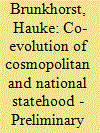

|
|
|
|
|
| Publication |
2012.
|
| Summary/Abstract |
The article claims that we should not just look towards a utopian future in fulfilling a claim about realization of a cosmopolitan, non-national world order. Already during antiquity the idea of a transcendent universal order took on a differentiated form at the same time as there happened to be institutionalization. Since the legal revolution of the long 12th century, this duality has been constitutional and has had a hierarchical structure. However, not only was the invention legal, it was also organizational; hence, the modern political, legal and organizational powers emerged long before the more celebrated state-building processes of the 16th and 17th centuries. The point is that the order was both political and cosmopolitan, institutional and universal. The nation-state was an exception compared with this long and widespread legacy of cosmopolitan power. But the universality of subjective rights was re-institutionalized according to principles that excluded inequalities. This was set in motion even before the UN Charter, not just with the ideas of 1789 but also institutionalized in Roosevelt's New Deal together with the social and political rights that were institutionalized specifically as a consequence of the World Wars and the political claims that followed.
|
|
|
|
|
|
|
|
|
|
|
|
|
|
|
|
| 2 |
ID:
151498
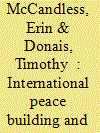

|
|
|
|
|
| Summary/Abstract |
This paper draws on constructivist theory to assess the contemporary debate around inclusion within peace-building and state-building processes and on inclusivity as an emerging norm within international policy processes. Within the wider context of an ongoing but still incomplete normative shift in terms of how peace building is both understood and practised, it focuses on the case of the New Deal for Engagement in Fragile States, and makes the case that the inclusivity agenda marks a significant shift towards fulfilling a longstanding commitment to respecting national ownership of peace-building processes.
|
|
|
|
|
|
|
|
|
|
|
|
|
|
|
|
| 3 |
ID:
073249
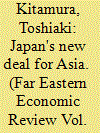

|
|
|
| 4 |
ID:
086092
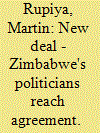

|
|
|
|
|
| Publication |
2009.
|
| Summary/Abstract |
Five months after the signing of a power-sharing agreement in Zimbabwe, a combination of international pressure and economic deterioration has facilitated its implementation. With the ruling Zimbabwe African Nation Union - Patriotic Front (ZANU-PF) agreeing to enter a coalition government with the opposition Movement for Democratic Change (MDC), a political compromise appears to have been reached, albeit a fragile one.
However, optimism over Zimbabwe's future stability needs to be tempered by a sober assessment of the agreement and the various actors in the deal. While both ZANU-PF and the MDC appear committed to the agreement in the short term, factionalism with ZANU-PF and the MDC, along with military discontent with the deal, could undermine its full implementation.
Image: President Robert Mugabe, centre, watched by Arthur Mutambara, left, shakes hands with Morgan Tsvangirai, the new prime minister of Zimbabwe, at the signing of the power-sharing deal ceremony in Harare on 15 September 2008.
|
|
|
|
|
|
|
|
|
|
|
|
|
|
|
|
| 5 |
ID:
146833
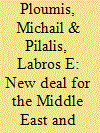

|
|
|
|
|
| Summary/Abstract |
Five years after the Arab uprisings in 2011, countries of the Middle East and North Africa (MENA) had difficulties finding their pathway to sustainable economic and political change. Arab oil-producing countries suffered from decreasing oil prices while the Arab non-oil-producing states struggled to provide better living conditions to their populations. Meanwhile, the war in Syria continued, the Islamic State (ISIS) was extending its efforts to establish a caliphate, and a massive influx of refugees was reaching Central Europe seeking asylum. In this context, it is imperative for Arab countries to establish substantial economic reforms in parallel with political change to enable their populations to remain in their homelands. The international community should support the MENA countries by introducing a “New Deal” to help lead to sustainable development and political change.
|
|
|
|
|
|
|
|
|
|
|
|
|
|
|
|
| 6 |
ID:
084481
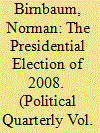

|
|
|
|
|
| Publication |
2008.
|
| Summary/Abstract |
Senators Barack Obama and John McCain each has severe problems. McCain must take his distance from the very unpopular President Bush while keeping the support of the core Republican voters, but suffers from lack of rapport with the Fundamentalist Protestants and traditionalist Catholics. In foreign policy, he is more devoted to US global hegemony (in a world which stubbornly refuses it) than the incumbent. Senator Obama knows that this is a dangerous illusion but thinks that it is unwise to say so. He supports Israel in exaggerated terms and repeats the fabrications of the war party about Iran. Obama has the difficulty of being part black and entirely intellectual, and he needs the votes of the working class men and women who are very reserved about him. McCain seeks low taxes and less government expenditure and intervention, but tens of millions of economically hard-pressed citizens are ready to return to the ethos and practices of the New Deal. Obama promises to revive the regulatory and redistributive role of government to help them, but his reluctance to criticise the arms budget may makes him seem unrealistic. Obama's vision of the United States puts the achievement of the American Revolution in the future whereas McCain thinks of the nation as already perfected. In many respects, we have a classical conflict between left and right.
|
|
|
|
|
|
|
|
|
|
|
|
|
|
|
|
| 7 |
ID:
089338
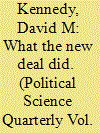

|
|
|
|
|
| Publication |
2009.
|
| Summary/Abstract |
David M. Kennedy revisits the New Deal's relevance to our own time. He concludes that the stubborn persistence of the Great Depression through the decade of the 1930s opened the political space for the New Deal's greatest accomplishments, all of which were aimed at reducing risk in key sectors of the economy and imparting a measure of security to American life for generations thereafter.
|
|
|
|
|
|
|
|
|
|
|
|
|
|
|
|
| 8 |
ID:
089417
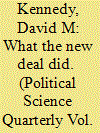

|
|
|